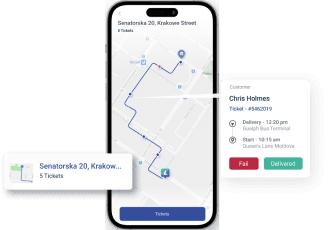TABLE OF CONTENTS
How do GPS Satellites Operate?
How Does GPS Figure Out Your Exact Location?
What are The Common Ways GPS Technology is Used?
How Does GPS Improve Fleet Management?
How Does GPS Help Give Accurate Estimated Arrival Times (ETAs)?
How Does GPS Contribute to Proof of Service?
How Can GPS Prevent Vehicle Breakdowns?
What Are The Benefits of GPS Integration with Fleet Management Software?
How Is GPS Used in Everyday Applications?
What Are the Challenges of Using GPS Systems?
How Is GPS Technology Evolving?
Why Is GPS Critical for Modern Businesses?
How Can You Choose the Right GPS System for Your Needs?
Conclusion

Sign-Up
Enter your email address
A network of satellites ensures GPS provides accurate location data. GPS is now an important part of daily life. But what exactly is GPS, and how does it work?
Let’s explore everything in detail.
How do GPS Satellites Operate?
GPS satellites circle the Earth and constantly send out signals. Each signal includes the satellite’s location and the precise time of transmission. GPS receivers on the ground pick up signals from different satellites. The receiver calculates its distance from each satellite based on the signal's travel time.
The system then uses this information to pinpoint the receiver’s location. This technique, called trilateration, provides precise location information.
How Does GPS Figure Out Your Exact Location?
GPS finds your location using trilateration. It needs signals from at least four satellites to work right. The GPS receiver tracks how long each signal takes to reach it. The receiver then calculates its distance from each satellite. These distances determine your position on Earth. The final output is your exact location regarding latitude, longitude, and altitude.
What are The Common Ways GPS Technology is Used?
GPS technology is used in many industries. It helps drivers find the fastest routes in transportation. It keeps aviation and maritime travel safe.
GPS helps with precision farming by aiding in planting, fertilizing, and harvesting crops. It is also important for managing disasters. It allows rescue teams to locate people quickly. Its applications make GPS indispensable in many aspects of your life.
How Does GPS Improve Fleet Management?
GPS enhances fleet management by allowing real-time tracking of vehicles. Fleet managers can monitor vehicle locations and plan routes more efficiently. It leads to reduced fuel consumption and improved service quality.
Therefore, GPS helps provide accurate ETAs to customers, which boosts satisfaction. It enables monitoring of driver behavior to ensure safe and efficient vehicle use. The technology reduces operational costs and enhances overall fleet performance.
How Does GPS Help Give Accurate Estimated Arrival Times (ETAs)?
GPS plays an important role in providing accurate ETAs. Managers can track the real-time location of vehicles and predict arrival times. This calculation considers current traffic conditions and vehicle speed.
Businesses can keep customers informed, leading to higher satisfaction. Accurate ETAs help with planning deliveries and reducing wait times. GPS ensures reliable and timely service, which is vital for customer trust.
How Does GPS Contribute to Proof of Service?
GPS provides a dependable way to verify services. The system records the time and location of each service visit. This data serves as proof that a service was completed as agreed.
Businesses can use this information to resolve disputes and ensure proper billing. GPS-based proof of service maintains transparency and accountability. It is a simple yet effective tool for service verification.
How Can GPS Prevent Vehicle Breakdowns?
GPS helps you prevent vehicle breakdowns through early detection of issues. Fleet management software, integrated with GPS, sends real-time alerts. Drivers and managers receive these alerts when potential problems arise.
Its timely information allows immediate action, which reduces the risk of breakdowns. GPS also tracks vehicle mileage and triggers maintenance reminders. This approach keeps vehicles in top shape and reduces the time they spend out of service.
What Are The Benefits of GPS Integration with Fleet Management Software?
GPS integration with fleet management software provides several benefits. Real-time tracking boosts operational efficiency. Managers can monitor locations, optimize routes, and save fuel. The integration also allows for better maintenance scheduling, which reduces unexpected breakdowns.
It enhances customer service through accurate ETAs and service verification. GPS integration makes operations smoother and increases productivity.
How Is GPS Used in Everyday Applications?
GPS is generally used in daily life. Smartphones use GPS in navigation apps to show directions. Fitness trackers use GPS to map running and cycling routes. Social media apps use GPS to tag locations, letting users share where they are.
Car safety features use GPS to send your location during emergencies. GPS makes many tasks easier and improves your daily life.
What Are the Challenges of Using GPS Systems?
GPS systems have their challenges. Signal interference can cause mistakes, especially in bad weather or crowded places. Privacy issues may arise when GPS tracking occurs without consent. So, users need to be aware of these potential drawbacks. Besides these challenges, GPS remains a valuable tool for various applications.
How Is GPS Technology Evolving?
GPS technology continues to evolve. Advances in satellite technology have improved signal accuracy. Newer systems offer better positioning, even in difficult environments. Integration with AI and IoT is expanding GPS capabilities.
Consequently, these innovations are making GPS more versatile and reliable. As technology progresses, GPS will continue to play a vital role in modern life.
Why Is GPS Critical for Modern Businesses?
GPS is essential for modern businesses. It improves operational efficiency and enhances customer satisfaction. In logistics, GPS enables better route planning and reduces costs. Service-based businesses benefit from GPS through accurate ETAs and proof of service.
GPS also plays a key role in fleet management. GPS provides businesses with a big advantage in a competitive market.
How Can You Choose the Right GPS System for Your Needs?
You can choose the right GPS depending on your specific needs. White label GPS tracking software with real-time updates and easy software integration is ideal for managing fleet.
Moreover, these features ensure better efficiency and lower costs.
Personal users should focus on accuracy, ease of use, and battery life. Compatibility with existing devices and software is also important. The right GPS will enhance operations and address your daily needs.
Conclusion
GPS technology has changed how we find our way and handle daily tasks. It offers precise location tracking, enhances fleet management, and improves customer satisfaction. Besides some challenges, GPS remains a critical tool in both personal and business applications.
GPS will continue to evolve as an advanced technology. It provides even more accurate and versatile solutions. You can choose the right GPS tailored to your needs that can greatly enhance efficiency and ensure reliable service.
Now, ready to upgrade your GPS? Discover the benefits of GPS asset tracking software and GPS fleet tracking. Start your free trial today or book a demo to explore how these technologies can transform your operations.

Aiden mitchell
As a GPS Tech geek, I find Lumyri's transformative impact on GPS technology on businesses and their customers. Real-time tracking information empowers businesses to provide accurate delivery estimates, allowing customers to plan their schedules with precision.



